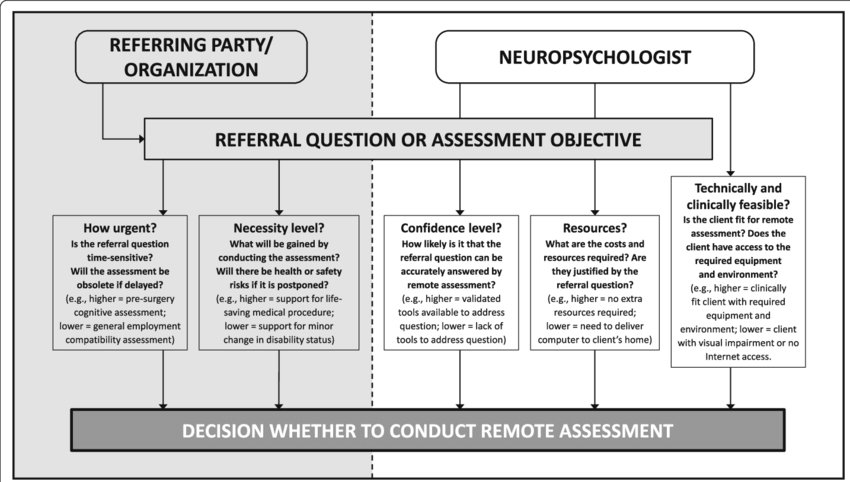
Neuropsychological assessments provide a unique lens through which individuals can gain a deeper understanding of their cognitive functioning, emotional regulation, and behavioral tendencies. These evaluations go beyond surface-level observations, offering a comprehensive view of your cognitive strengths, areas for growth, and the factors influencing your decision-making processes. Whether you’re navigating personal challenges, pursuing career advancement, or striving to build stronger social connections, a neuropsychological evaluation for adults can be an essential tool for growth and self-improvement. In this post, we’ll explore how neuropsychological assessments contribute to personal development, empower professional success, and help you foster better relationships by providing deeper insights into your cognitive and emotional makeup.

Cognitive profile analysis is the cornerstone of neuropsychological assessments. It involves a detailed evaluation of various cognitive functions, including memory, attention, problem-solving, and processing speed. This analysis paints a clear picture of your cognitive abilities, helping you understand not just what you are good at, but also the areas where you may face challenges.
Reduce Challenging Behaviors – One critical aspect of cognitive development that can be identified through neuropsychological assessment is how children build resilience. Resilience enables children to bounce back from adversity, significantly reducing challenging behaviors. By promoting emotional regulation, developing problem-solving skills, and encouraging a positive mindset, children can better cope with difficulties, leading to improved behavior and overall well-being.
Understanding how resilience is formed and nurtured in children can be valuable for both parents and educators in addressing challenging behaviors effectively.
Ultimately, cognitive profile analysis enables you to make more informed decisions about your career, education, and personal development, aligning your actions with your inherent strengths.
Neuropsychological assessments also help uncover your unique learning style, which can be a game-changer in how you approach new information or skills. There are different ways individuals learn best, and understanding your preferred learning mode can optimize how you process and retain information.
Identifying your learning style can help you tailor your educational or training approaches to maximize efficiency and success.
Once your cognitive profile and learning style have been identified, tailored interventions can be developed to help you reach your fullest potential. These interventions are specifically designed to enhance your cognitive abilities and address areas that may need improvement.
Personalized interventions are not just reactive; they’re a proactive way of ensuring you can continue to thrive in various aspects of your life.
One of the most impactful benefits of neuropsychological assessments, including Neuropsychology Testing NJ, is how they improve your social interactions. By understanding your cognitive and emotional tendencies, you gain valuable insight into how you connect with others, communicate, and navigate relationships.

This understanding helps you reduce conflicts, foster empathy, and create stronger personal and professional bonds.
In a world full of choices, neuropsychological assessments provide data-driven insights that can guide your decisions, whether in personal life, career, or education. These assessments offer a clear picture of your cognitive strengths and weaknesses, enabling you to make decisions based on facts rather than assumptions.
By making decisions based on data-driven insights, you position yourself for greater success and fulfillment.
Neuropsychological assessments are not just for personal growth; they also serve as powerful advocacy tools. When you understand your cognitive strengths and weaknesses, you can advocate for the support you need in various settings, such as education, work, or healthcare.
Using neuropsychological insights, including those from Pediatric Neuropsychology Service NJ, as a form of advocacy ensures that you receive the necessary resources and support to succeed in all aspects of life.
Self-awareness in the workplace is invaluable. Knowing your cognitive profile helps you understand how you approach tasks, make decisions, and collaborate with others. This insight enables you to navigate your career more effectively and make choices that align with your strengths.

Self-awareness helps you navigate your professional journey with confidence, increasing your chances of long-term success.
As we learn more about ourselves through neuropsychological assessments, we are better equipped to communicate our needs to others. This fosters a supportive network of family, friends, colleagues, and mentors who can help us achieve our goals.
Building a strong support network ensures you have the right people behind you as you navigate life’s challenges.
A Pediatric Neuropsychology Service NJ offers a wealth of information that can significantly enhance your life. From uncovering your learning style to understanding your cognitive strengths and weaknesses, these assessments provide essential insights that can guide your decisions, improve your relationships, and help you thrive in all areas of life. By understanding yourself on a deeper level, you can make more informed choices, advocate for necessary accommodations, and build a support system that helps you reach your full potential. Investing in a neuropsychological evaluation is an investment in your future success and well-being.
440 West Street, Suite 323, Fort Lee, NJ, 07024
[email protected]
Phone: (347) 879 0202
Copyright © 2025 | All Rights Reserved | Created By Invisio Solutions Ltd